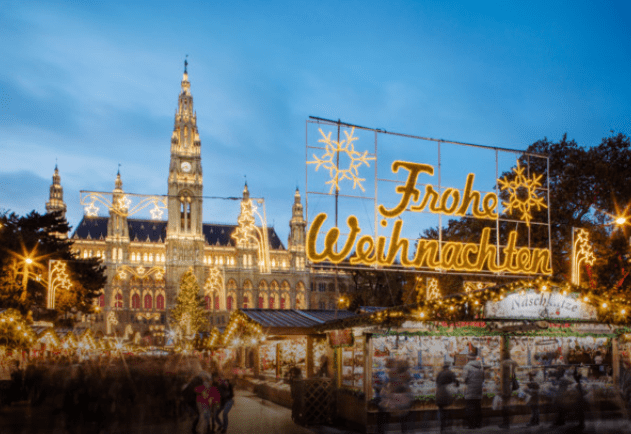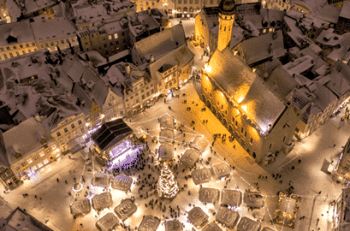With so many great festive experiences available, one excellent way to celebrate is to visit a European Christmas market – and one of the best (we think!) are the Vienna Christmas markets.
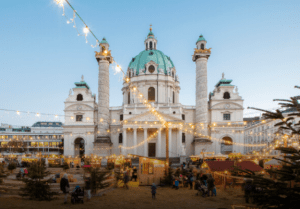 There’s a must-visit market called the Wiener Christkindlmarkt which is in the heart of Vienna, at the Rathausplatz, the square in front of the impressive neo-Gothic town hall.
There’s a must-visit market called the Wiener Christkindlmarkt which is in the heart of Vienna, at the Rathausplatz, the square in front of the impressive neo-Gothic town hall.
There are also other markets scattered around the city, such as the one at St Stephen’s Square.
Here, the Christmas.co.uk team takes a closer look at Vienna at Christmas and offers our own experiences.
When are the Vienna Christmas markets in 2024?
The exact dates for the Christmas market vary each year, but they typically start in mid-November and continue until just after Christmas.
In 2024, these are the dates for your diary:
- Christkindlmarkt: November 16 – December 26 2024
- Karlsplatz: November 15 – December 23 2024
- Schönbrunn: November 8 2024 – January 6 2025
- Belvedere: November 15 – December 26 2024
- Spittelberg: November 16 – December 23 2024
- Maria-Theresien-Platz: November 13
- Am Hof: November: 15 – December 23 2024
- Stephansplatz: November 8 – December 26 2024
For a full list of locations and dates for Vienna’s Christmas markets, visit the official website.
Why visit Vienna’s Christmas markets?
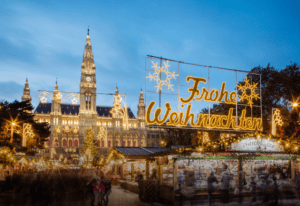 The Christmas markets in Vienna are a feast for the senses with dozens of stalls offering a variety of traditional Austrian goods, including handmade gifts, Christmas decorations and delicious food.
The Christmas markets in Vienna are a feast for the senses with dozens of stalls offering a variety of traditional Austrian goods, including handmade gifts, Christmas decorations and delicious food.
You will find the atmosphere at the markets is warm and inviting, making them the perfect place to spend an afternoon or evening.
, including a large Ferris wheel and an illuminated walking trail with numerous nativity scenes. The market also has a carnival vibe, with a double-decker carousel and a large ice-skating rink.
All of Vienna’s Christmas markets are easy to reach on foot (or public transport and when illuminated with festive lights, this is a city that’s hard to beat for a festive visit.
Along with the Christmas markets, Vienna is home to a wealth of cultural and historical attractions.
These include the Hofburg Palace, the Vienna State Opera, and the Schönbrunn Palace.
The city is also renowned for its museums, such as the Leopold Museum and the Jewish Museum.
Don’t forget too that you could fit in a trip to which are easy to get to from Vienna by train.
oooOooo
VIENNA’s Christmas Wonderland: Europe’s Most Beautiful Markets!
This is an excellent video from Rok Goes Around, who is a tour guide in the Austrian city of Vienna.
He reveals that Vienna has 10 major Christmas markets and several smaller ones, so there’s a lot to enjoy.
The Christmas lights in the streets are impressive and the stalls are great.
Being a tour guide, there’s a good running commentary on the history of the squares where the markets are held.
For mulled wine lovers, Rok also tells us that each market has its own that changes every year- a tempting proposition to collect all of them!
Along with tasty food, the stalls offer unique Christmas gifts and ornaments.
The market at Karlsplatz offers organic food with the gifts on sale being made locally.
From the quick tour, Vienna’s Christmas markets do have a lot to offer and will make for a great festive trip!
oooOooo
Which Christmas markets in Vienna should I visit?
With so much choice, we can say that most of the markets have their own charms and attractions.
The most famous market is the Christkindlmarkt or ‘Viennese Dream Christmas Market’ which is held in front of the magnificent Rathaus (City Hall).
Here, you’ll find a dazzling Christmas tree, a labyrinth of wooden stalls and a magical atmosphere that has captivated visitors for generations.
If you only have time for one market visit, then make it this one.
With more time, we were taken by the Belvedere Palace market with its baroque setting – with 40 stalls offering festive food and traditional crafts.
The Christmas Village which is in Maria Theresien Square is also worth a visit. Again, the setting is impressive – it’s located between the Museum of Art and the Museum of Natural History.
History of the markets
The tradition of Christmas markets in Vienna dates from the Middle Ages, making them among the oldest in Europe.
The first market, which was known as ‘December Market’, was held in 1298 – so, Vienna could lay a sound claim to being home to the oldest Christmas market in Europe.
It was originally created as a market for people to stock up on food and goods for the long winter months and they have evolved since then.
Over the centuries, the markets became popular for gift buying and enjoying seasonal treats, but they have always remained a popular part of the city’s festive season.
What makes Vienna special at Christmas?
Vienna’s Christmas markets offer a unique experience unlike any other. Here are some highlights:
- Ambiance: The city offers a captivating atmosphere with wooden stalls bedecked with festive lights and lots of carollers helping to spread the cheer.
- Craftsmanship: Along with the food and mulled wine, Vienna offers a treasure trove of hand-crafted goods made by local artisans. From delicate glass ornaments and intricately carved wooden gifts and toys to handcrafted jewellery and warm woollen scarves, there’s something for every taste and budget.
- Food: Having mentioned the food, why not try some local specialities like melt-in-your-mouth Kaiserschmarrn (a fluffy pancake dish), warm gingerbread hearts and mugs of tasty Glühwein (mulled wine). There are plenty of outlets offering roasted chestnuts too.
- Culture: Vienna is a city steeped in history and culture so there’s plenty to do along with the markets. Explore the Schönbrunn Palace, the Hofburg Imperial Palace and St Stephen’s Cathedral.
Here are a few more suggestions:
- Art and culture: Vienna has a vibrant art scene and there are renowned museums like the Kunsthistorisches Museum (Museum of Art History) and the Albertina Museum, housing masterpieces from across Europe. Explore iconic palaces like Schönbrunn Palace and the Hofburg Palace, offering a glimpse into Vienna’s imperial past.
- Classical music: Vienna is the undisputed capital of classical music. Attend a concert by the Vienna Philharmonic Orchestra or the Vienna Boys’ Choir for an unforgettable experience.
- Heuriger wine taverns: Experience a quintessential Viennese tradition by visiting a Heuriger, a cosy tavern where you can sample local wines and enjoy simple Austrian cuisine. Be warned though that these taverns do get very busy when the markets are being held.
- Day trips: Explore the surrounding region by taking a day trip to Salzburg, Mozart’s birthplace, or venture out to the picturesque Wachau Valley, renowned for its vineyards and charming villages.
If you love your visit to Vienna for Christmas, it’s worth considering the excellent Christmas markets in Munich – a great city that knows how to enjoy the festivities – and there’s Budapest too with its Hungarian customs, great food and lively atmosphere.
oooOooo
Inside the BEST Vienna Christmas Markets, & what to expect!
Here’s a video from Probably Lost who visit the ‘capital of Christmas markets’.
The duo visited (They are: Schonbrunn Palace, Maria Theresien Platz, Stephanplatz, Am Hof, Altweiner and Rathausplatz) and they are suitably impressed with what is on offer.
They also show how easy it is to visit various markets using public transport, particularly the Ubahn.
Along with the cold weather, the presenters praise the unusual and historic settings of the markets.
They also indulge in a local delicacy that looks like a mac n cheese – with bacon bits sprinkled on top.
The markets in the centre of Vienna are easy to reach on foot and we were taken by the stall selling deep fried crispy rice balls with fillings such as curry, ragu and pizza.
The video ends with a good recap of the markets’ attractions including skating, lovely festive lights and the great-looking stalls.
OOOoOOO
Tips for a great visit
When visiting the Christmas markets in Vienna, there are a few tips to keep in mind.
Firstly, we found that it’s important to carry cash since we found that many stalls don’t accept cards. The currency in Austria is the euro.
Also, this can be a very cold city in winter so you’ll need lots of layers – the weather can (and does!) change quickly.
Lastly, learning a few German phrases can help enhance your experience. You will find that English is widely spoken but these are useful phrases:
- Guten tag (Good day)
- Bitte (Please)
- Danke (Thank you)
- Frohe Weihnachten (Merry Christmas)
The word ‘Prost’ is a common toast – or ‘Cheers’.
However, our most important tip for those visiting for the first time is to visit the markets during the week and not the weekend when things get very busy.
Also, visiting when the markets open is useful and you can explore other areas and attractions later.
You should also research which markets you would like to visit beforehand.
What else is there to do in Vienna?
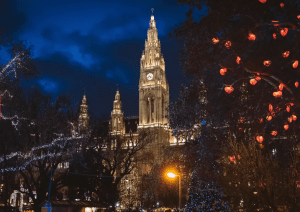 Vienna is so much more than its Christmas, and as a capital city, there’s a huge range of other things to do. They include:
Vienna is so much more than its Christmas, and as a capital city, there’s a huge range of other things to do. They include:
History: Vienna has an interesting history and is wonderful to stroll through – the centre is a UNESCO World Heritage Site. There are vibrant squares, charming streets and architectural gems to admire.
Schönbrunn Palace: Visit the Schönbrunn Palace (Schloss Schönbrunn), which was the Habsburg family’s summer residence. This family ruled the country from 1282 until 1918. The Palace has incredible interiors and lovely gardens to stroll in.
- Kunsthistorisches Museum: For art lovers everywhere, the Kunsthistorisches Museum (the Museum of Art History) should certainly be on your Vienna to do list. Home to an impressive collection of art and historical artefacts, including from ancient Egypt and Greek and Roman antiquities.
- Classical concerts: Vienna is synonymous with classical music. Attend a concert at iconic venues such as the Vienna State Opera, St Peter’s Church, or the Musikverein. Let the genius works of Mozart, Beethoven and Strauss move you.
- St Stephen’s Cathedral: Admire the stunning architecture of St Stephen’s (Stephansdom). It’s worth climbing to the top for panoramic views of the city.
- City tours: We found that exploring Vienna’s nooks and crannies using a guided city tour was worth the money. Whether by foot, bike, or bus, these tours offer fascinating insights into the city’s history and culture.
Vienna is a striking city of art, music and history and even a short visit will deliver excellent experiences and memories.
Here are more tips to help you enjoy your stay:
- Warm up: This is important since Vienna can get cold and the crowds can be tiring. So, take regular breaks inside cafes or restaurants (or taverns!) to warm up and recharge.
- Public transport: The city has excellent public transport so read up on it before arriving – doing so will make your travels around the city much easier. We recommend buying a Vienna City Card for unlimited travel on trams, buses and the metro.
- Enjoy: If you’ve never been to a European Christmas market before then it’s time to immerse yourself in the festive atmosphere. Chat with local traders, enjoy the delicious treats – and get into the Christmas spirit!
Travelling to Vienna for Christmas
Vienna is well-connected by air, with flights from many UK airports. From London Heathrow, the flight to Vienna takes 2 hrs 20 mins.
There are cheap flights to Vienna from a range of operators, including Ryanair, from a variety of UK airports. According to British Airways, the cheaper flights to Vienna are in the winter but we think it’s advisable to book tickets well in advance of travel.
UK airports with regular flights include London Heathrow Airport where British Airways and Austrian Airlines operate direct flights. Gatwick also has a wide choice of flights, including from discount flyer Wizz Air, while Ryanair operates from London Stansted.
Check out the flights from Luton and London City Airport too.
Other UK airports heading to Vienna include Bristol, Manchester, Birmingham, Leeds Bradford, East Midlands and Newcastle. In Scotland, travellers can fly from Glasgow and Edinburgh.
Once in Vienna, there’s a very good public transport system that is efficient and easy to use.
When it comes to accommodation, Vienna offers a range of options, from luxury hotels to budget-friendly Airbnb rentals.
- Hotels: If your budget allows it, look at a luxurious experience in a grand hotel near the city centre such as the Hotel Imperial or the Palais Coburg. For a more traditional feel, opt for a charming boutique hotel nestled in a historic district. Booking.com offers a range of quality hotels at reasonable prices – considering how expensive Vienna can be. Most of the hotels have excellent visitor scores and feedback so finding a lovely, comfortable hotel in the city shouldn’t be too difficult. There’s a good choice of apartments too and the pricey hotels can be very expensive. Smaller family-run hotels are also available.
- Airbnbs: Airbnbs offer a more local experience and can be a cost-effective option. Look for apartments located in neighbourhoods close to Christmas markets, such as Innere Stadt (First District) or Neubau (Seventh District). Most of the homes to rent are at reasonable prices and offer a much cheaper experience than pricey hotels. We found many Airbnbs are close to public transport. Larger properties are also available –
Vienna also offers well-priced hostels, and you could consider a cheaper location and travelling in for the markets by train.
Budgeting for your Vienna Christmas market trip in 2024
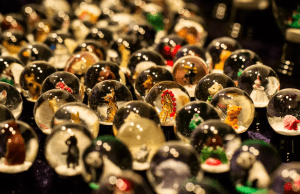 Here’s a rough estimate when budgeting to visit Vienna for the Christmas markets in 2024.
Here’s a rough estimate when budgeting to visit Vienna for the Christmas markets in 2024.
Food and drink: There are some lovely coffee houses to enjoy in Vienna – expect to pay up to €4.80. Roasted chestnuts, up to €3 per serving, and gingerbread cookies between €2 to €4 for a gingerbread treat. Mulled wine (Glühwein): prices vary but you’ll find they cost around €4 to €5. There’s also a €5 deposit fee for the decorative mug.
- Hotels: There are budget-friendly hotels available for around €60 to €80 per night, mid-range hotels are €80 to €160 per night. Luxury hotels can start from €160 per night and go up significantly.
- Souvenirs and gifts: There’s a great choice of handmade ornaments, wooden toys and other unique gifts – so budget €16 to €40 for souvenirs and small purchases.
- Transport: Vienna has an efficient public transport system. Budget around €8 to €16 per day for tram and U-bahn tickets.
- Entertainment: Renowned for its classical music scene, you can attend a concert at venues like the Vienna State Opera or Musikverein with tickets ranging from €40 to €120 depending on the performance and seating.
We also think that budgeting for museums or historical sites should be around €10 to €20 per attraction.
Visit the Christmas markets in Vienna
With its rich history, stunning architecture and festive atmosphere, the Christmas market in Vienna offers a unique festive experience.
Whether you’re looking for unique gifts, delicious food or simply a dose of Christmas cheer, Vienna’s Christmas market is sure to deliver.

